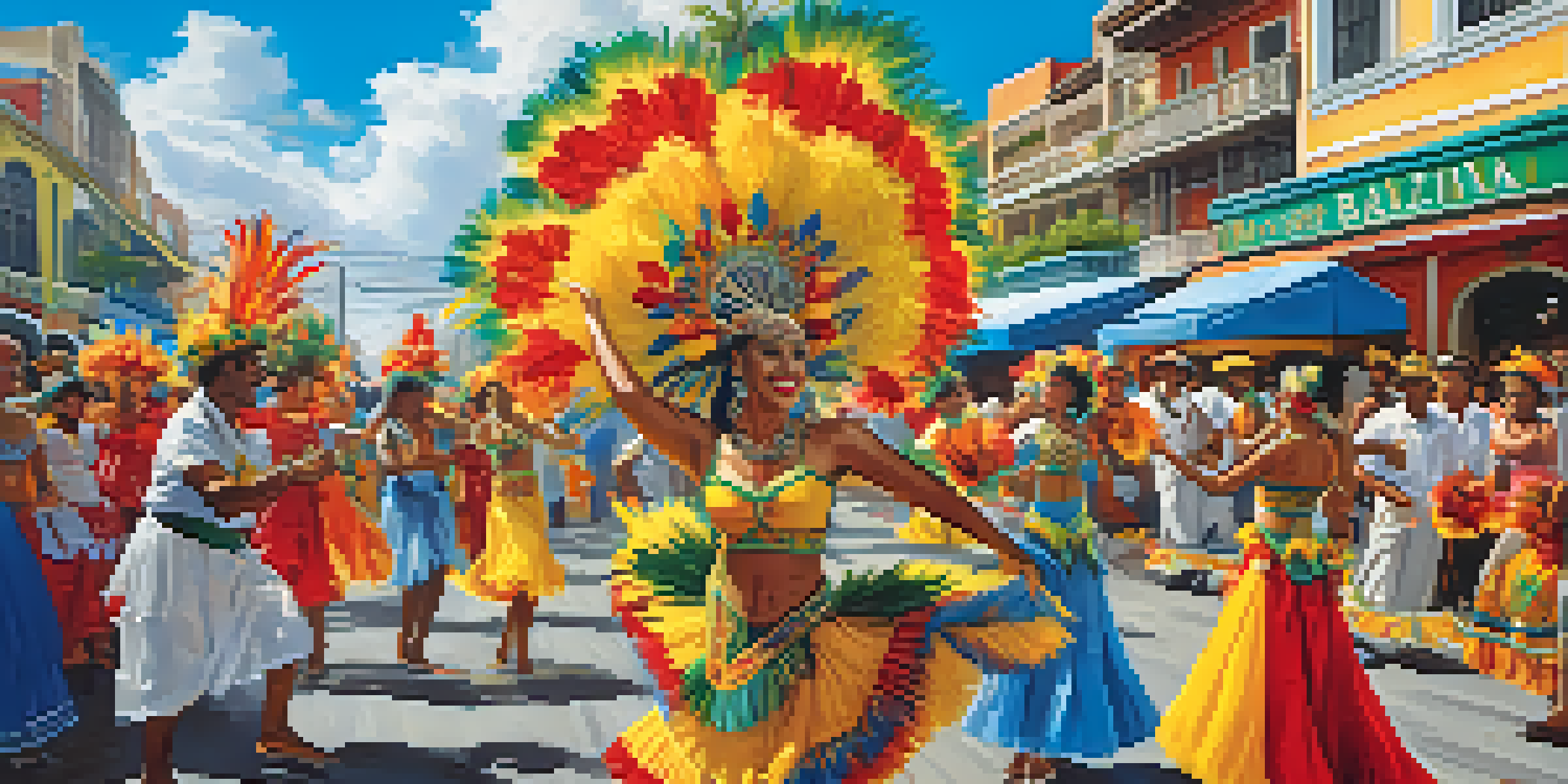The Impact of Portuguese Language on Brazilian Identity

The Historical Roots of Portuguese in Brazil
Portuguese arrived in Brazil with the arrival of the Portuguese explorers in the 1500s. As they colonized the land, their language began to intertwine with indigenous tongues and the languages of enslaved Africans. This fusion created a unique linguistic landscape that still influences Brazilian culture today.
Language is the road map of a culture. It tells you where its people come from and where they are going.
Over the centuries, Portuguese not only served as a means of communication but also as a tool for administration and education. The establishment of schools and institutions further solidified the language's dominance. Consequently, it became a vital part of Brazil's colonial identity.
The historical context of Portuguese in Brazil illustrates how language can shape a nation’s identity. The blend of languages and cultures laid the groundwork for Brazil’s rich diversity, showing that language is not just a means of communication but also a vessel of cultural heritage.
Portuguese as a Unifying Force in Brazil
Despite Brazil's vast diversity, Portuguese serves as a unifying thread that connects its people. With over 200 million speakers, it is the primary language in a country that boasts multiple ethnicities and cultures. This common language facilitates communication and fosters a sense of belonging among Brazilians.

In daily life, Portuguese helps bridge gaps between different communities, enabling people from various backgrounds to engage and share experiences. Whether through music, literature, or conversation, the language cultivates a shared identity that transcends regional differences.
Portuguese Shapes Brazilian Identity
The intertwining of Portuguese with indigenous and African languages has created a unique cultural identity in Brazil.
Moreover, the use of Portuguese in national media and literature strengthens this unity. When Brazilians consume news, music, and films in their native language, they not only preserve their culture but also reinforce their collective identity as a nation.
The Influence of Regional Dialects on Brazilian Identity
Brazil is home to numerous regional dialects and variations of Portuguese, each reflecting the unique cultural influences of its area. From the melodic accents of the Northeast to the more European-sounding tones of the South, these dialects enrich the language and showcase Brazil's diversity.
A different language is a different vision of life.
These regional variations contribute significantly to Brazilian identity by allowing people to express their local heritage and pride. They serve as a reminder of Brazil's multifaceted culture, where language acts as a marker of both locality and community.
Additionally, the recognition and appreciation of these dialects in music and popular culture further celebrate Brazil's rich linguistic tapestry. This cultural pride helps forge a stronger national identity, even as it embraces regional differences.
The Role of Portuguese in Brazilian Literature and Arts
Portuguese has played a pivotal role in shaping Brazilian literature and arts, serving as a vehicle for self-expression and cultural exploration. Renowned writers like Machado de Assis and Clarice Lispector have used the language to delve into the complexities of Brazilian society, identity, and human experience.
Through poetry, novels, and theater, Portuguese allows artists to explore themes of love, struggle, and identity, resonating deeply with Brazilian audiences. The richness of the language enhances the emotional depth and resonance of their works, making them timeless.
Regional Dialects Enrich Culture
Diverse regional dialects of Portuguese reflect local heritage and contribute to the country's multifaceted identity.
Moreover, the celebration of Brazilian literature in Portuguese fosters a connection among readers and writers, creating a shared cultural experience. This literary tradition not only reinforces identity but also positions Brazil as a vibrant player in global literary discourse.
Portuguese in Brazilian Music and Cultural Expression
Brazilian music is a vibrant expression of culture, and Portuguese is the heartbeat of many genres, from samba to bossa nova. The lyrics, often rich with emotion and storytelling, reflect the Brazilian experience and resonate with audiences both locally and internationally.
Artists like Caetano Veloso and Gilberto Gil use the Portuguese language to convey social and political messages, further underscoring its role in shaping Brazilian identity. Through their music, they celebrate the nuances of Brazilian life, making the language an integral part of cultural expression.
The global appeal of Brazilian music in Portuguese also showcases how language can transcend borders. It invites listeners from diverse backgrounds to engage with Brazilian culture, fostering an understanding and appreciation of its unique identity.
Challenges to the Portuguese Language in Brazil
While Portuguese serves as a unifying force, it also faces challenges, particularly from globalization and the influence of English. The rise of digital communication has led to an influx of English terms, which can sometimes overshadow the richness of the Portuguese language.
Moreover, the growing popularity of social media has given rise to new linguistic trends, often favoring informal language and abbreviations. This evolution, while a natural part of language development, poses a risk to the preservation of traditional Portuguese.
Challenges from Globalization Persist
While Portuguese remains a unifying force, globalization and the influence of English pose significant challenges to its preservation.
Despite these challenges, many Brazilians are actively working to promote and preserve their language. Efforts in education, literature, and cultural initiatives highlight the importance of Portuguese as a cornerstone of Brazilian identity.
The Future of Portuguese and Brazilian Identity
Looking ahead, the future of Portuguese in Brazil is hopeful, as younger generations continue to embrace their linguistic heritage while navigating a rapidly changing world. Educational initiatives that celebrate the language and its diverse dialects are paramount for maintaining its significance.
Additionally, the influence of technology can be harnessed to promote the Portuguese language, making it more accessible and engaging for younger audiences. Language apps, online courses, and social media campaigns can help foster a love for Portuguese.

Ultimately, the evolution of the Portuguese language in Brazil will continue to shape national identity. As Brazilians blend tradition with modernity, the language remains a vital link to their rich cultural past and a beacon for their future.